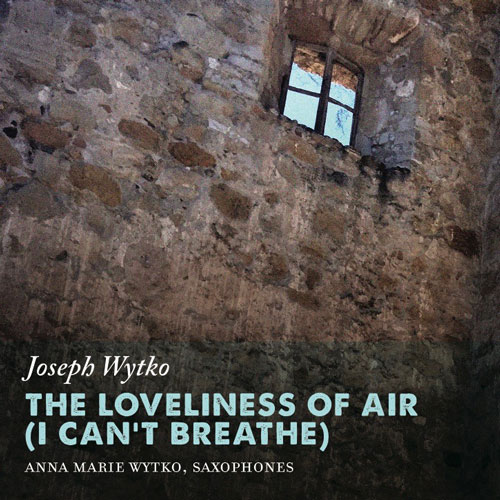August 17, 2020
Saxophone professor releases electroacoustic compact disc recording 'The Loveliness of Air (I Can’t Breathe)'

Anna Marie Wytko, associate professor of saxophone, released the compact disc recording "The Loveliness of Air (I Can’t Breathe)" on the TimeGrabber Digital label.
An original electroacoustic composition, "The Loveliness of Air (I Can’t Breathe)" is a new composition more than 70 minutes in length that is comprised of 16 movements. Composed by Joseph Wytko, the piece is based upon select poetry and prose of children under the age of 15 who were victims of the Theresienstadt (Terezín) Nazi concentration camp between the years 1942 and 1944. The work features uncompressed audio and is scored for electronic and acoustic instruments and sounds, more than 10 narrators and one vocalist narrating/singing in over a dozen languages, and acoustic saxophone soloist Anna Marie Wytko, who is featured on alto and baritone saxophones.
According to Wytko, "The Loveliness of Air (I Can’t Breathe)" reflects two motifs very precisely associated with prejudice, racism, bigotry, stereotyping, discrimination, sexism, and demagogues and propaganda. The first and overwhelmingly dominant theme is reflected by the principal title: "The Loveliness of Air." These words begin the second stanza of a poem titled "Pain Strikes Sparks on Me, The Pain of Terezín," written by an anonymous child imprisoned in Terezín.
The second theme is reflected by the subtitle of the work: "I Can’t Breathe." These words were the final words uttered eleven times by Eric Garner (1970-2014), an African American who died after being placed in an illegal chokehold for 15-19 seconds by a New York City police officer.
Wytko said the composition can and should be viewed in numerous ways. It can be considered as a multimedia work, as an electroacoustic work with theater, and as a work that speaks to issues that are very relevant today — including in the United States. It is all of these things. Perhaps, however, it can be viewed most appropriately as was described by a member of the audience following the world premiere performance at the Kerr Cultural Center in Scottsdale, Arizona: as a "meditation" on what is fundamental to all that is human.
The work has an overarching theme of promoting inclusivity versus exclusivity. Examples of inclusivity would include the inclusion of acoustic and synthetic instruments — as well as the blending of the two; instrument choices — instruments used from around the world; and numerous narrators narrating/singing numerous languages, to name a few. Synthesized — electronic — sounds often appear as synthetic sounds; however, synthesized sounds are often processed to mimic acoustic sounds. Acoustic sounds are presented most assuredly as acoustic sounds, but are, from time to time, processed to mimic synthetic sounds or electronic instruments. There is also the question of what may exist between the "synthetic" and the "acoustic" — what many refer to as the "divided line." Should the listener not be certain in this regard, this is purposeful. Consistent with the idea of inclusivity, no types of sounds — even those imagined — are marginalized.
Yet another consideration that nourishes inclusivity involves instrument choices. The number of musical instruments incorporated into "The Loveliness of Air (I Can’t Breathe)" is inordinately abundant. In addition to the acoustic instruments performed live on stage (saxophone, variety of percussive instruments), recorded instruments include all of the standard orchestral instruments, piano, harp, a variety of acoustic guitars, a variety of electric guitars, numerous percussion instruments rarely associated with standard orchestras or bands in Western culture, and instruments from China, Afghanistan and other countries. Additionally, an assortment of synthesizers and synthesizer-like instruments are encompassed.
Paramount to this composition is the poetry and prose left by children who suffered in the Terezín Prison Camp. These writings, as well as drawings, are preserved in the archives of the State Jewish Museum in Prague. Terezín is approximately 37 miles from Prague. That such heart-wrenching words could be written by children is truly staggering, and it is here — in their words about fear, about longings, about dreaming, about loss — where the essence of the work resides. Eleven poems and one text in prose form authored by children of the Terezín Prison Camp were selected for "The Loveliness of Air." Four of the 16 movements include text from sources other than the children who were victims of Terezín. These include a Hebrew prayer, Latin prayers excerpted from the Catholic Eucharist, a poem by Max Kalbeck titled "Last Happiness," and a poem by Hermann Allmers titled "Late Autumn." Article authored by Joseph Wytko.
This recording is made possible in part by grants from Kansas State University. For further information, visit Wytko’s website at AnnaMarieWytko.com.
